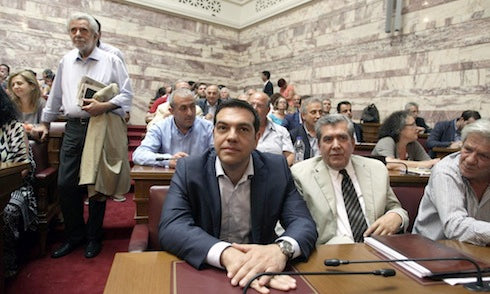Greek debt crisis brings discord within Syriza as Tsipras hopes for leap of faith

Alexis Tsipras' proposals to Greece's creditors prove so divisive among MPs that even if deal is accepted by lenders he faces a battle to gain his parliament’s approval. This article was originally published in the Guardian, by Helena Smith, Wednesday 24 June.
Simela Pantzartzi/EPA
By Helena Smith, Wednesday 24 June
The internal faultlines in Greece’s governing Syriza party grew wider on Wednesday as its members digested the sheer scale of concessions being demanded to avert a bankruptcy and remain in the eurozone.
With the battle lines now firmly drawn between Athens and its creditors, senior Syriza figures took rhetorical potshots at the tactics employed by the debt-stricken country’s lenders as prime minister Alexis Tsipras attended back-to-back talks in Brussels.
“The European Union’s neoliberal elite has lost touch with reality,” said the interior minister, Nikos Voutsis. “Every day they argue among themselves or bring issues that supposedly had been solved, or put to one side, on the table. It is an unacceptable situation that has to stop.”
Voutsis was speaking in the Greek parliament as Syriza’s secretariat met in an urgent session to discuss the reforms Tsipras has proposed to reach a deal with lenders. An agreement would unlock the bailout funds desperately needed to avoid default: Athens must pay €1.6bn (£1.1bn) to the IMF next Tuesday.
The mood at the party’s headquarters was anything but upbeat. While Alekos Flambouraris, the minister of state and a close Tsipras ally, spoke of the need to endorse an agreement that was both necessary and honourable, insiders said it was now clear the anti-austerity movement was fighting an existential battle.
The government’s proposed measures – a combination of tax increases and budget cuts outlining €8bn in savings over the next 17 months – is so at odds with party ideas it would require a near-impossible leap of faith to get them passed.
“And any agreement that is reached will have to be endorsed by Syriza’s internal organs,” the party’s secretary, Tassos Koronakis, was quoted as saying. “The government is fighting a very tough battle against unbelievable tactics of blackmail and unprecedented credit strangulation.”
In Brussels on Wednesday night, Greek officials described creditors’ latest demands – for more pension cuts and VAT hikes – as “nothing short of barbaric”.
Even if lenders accept a compromise, it is clear that Tsipras will have a battle on his hands to get the deal ratified by his national parliament, as both the EU and IMF have demanded.
At least 10 MPs have indicated that they will oppose a deal if it is based on the 47-page package of proposals the government has made. At least 10 more are wavering, and it remains unclear what hardliners, gathered under the Left Platform faction led by the energy minister, Panagiotis Lafazanis, will also do. The former communist, in effect the third most powerful man in Greece’s government, has remained uncharacteristically coy about the stance he will take, saying he will only decide once a deal is reached.
Zoe Konstantopoulou, the 300-seat parliament’s president, who also holds sway over the party, has similarly refused to divulge which way she will go.
In the outcry over the measures, those within Syriza who openly advocate a return to the drachma have been emboldened, with several holding neighbourhood meetings to denounce the government’s retreat across its own “red lines” on pensions and VAT.
“The only way to keep Syriza united is to avoid capitulation,” said Stathis Kouvelakis, a member of Syriza’s central committee.
Echoing the complaints of a growing number of factions, Kouvelakis, who teaches political theory at King’s College London, said it was clear that creditors wanted to “break the party politically”.
“What we are seeing is a pseudo-negotiation, a relentless effort to always impose more and more concessions,” he said, speaking from London. “They are never satisfied: they want everything and they want it now because they want to destroy Syriza.”
If Tsipras were to go ahead with the policies, Europe’s first radical left government would pay a heavy price, Kouvelakis believes. “It will be the end of breaking with austerity politics and exploring alternatives – the whole experiment will come to an end.”